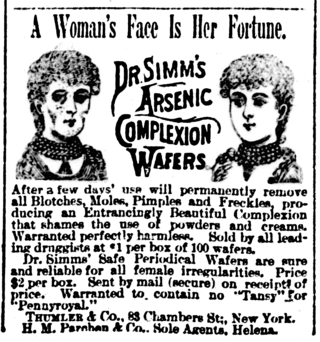Adware, often called advertising-supported software by its developers, is software that generates revenue for its developer by automatically generating online advertisements in the user interface of the software or on a screen presented to the user during the installation process. The software may generate two types of revenue: one is for the display of the advertisement and another on a "pay-per-click" basis, if the user clicks on the advertisement. Some advertisements also act as spyware, collecting and reporting data about the user, to be sold or used for targeted advertising or user profiling. The software may implement advertisements in a variety of ways, including a static box display, a banner display, a full screen, a video, a pop-up ad or in some other form. All forms of advertising carry health, ethical, privacy and security risks for users.

The Federal Trade Commission (FTC) is an independent agency of the United States government whose principal mission is the enforcement of civil (non-criminal) antitrust law and the promotion of consumer protection. The FTC shares jurisdiction over federal civil antitrust law enforcement with the Department of Justice Antitrust Division. The agency is headquartered in the Federal Trade Commission Building in Washington, DC.
DoubleClick Inc. was an American advertisement company that developed and provided Internet ad serving services from 1995 until its acquisition by Google in March 2008. DoubleClick offered technology products and services that were sold primarily to advertising agencies and mass media, serving businesses like Microsoft, General Motors, Coca-Cola, Motorola, L'Oréal, Palm, Inc., Apple Inc., Visa Inc., Nike, Inc., and Carlsberg Group. The company's main product line was known as DART, which was intended to increase the purchasing efficiency of advertisers and minimize unsold inventory for publishers.

Scareware is a form of malware which uses social engineering to cause shock, anxiety, or the perception of a threat in order to manipulate users into buying unwanted software. Scareware is part of a class of malicious software that includes rogue security software, ransomware and other scam software that tricks users into believing their computer is infected with a virus, then suggests that they download and pay for fake antivirus software to remove it. Usually the virus is fictional and the software is non-functional or malware itself. According to the Anti-Phishing Working Group, the number of scareware packages in circulation rose from 2,850 to 9,287 in the second half of 2008. In the first half of 2009, the APWG identified a 585% increase in scareware programs.

False advertising is the act of publishing, transmitting, or otherwise publicly circulating an advertisement containing a false claim, or statement, made intentionally to promote the sale of property, goods, or services. A false advertisement can be classified as deceptive if the advertiser deliberately misleads the consumer, rather than making an unintentional mistake. A number of governments use regulations to limit false advertising.
Online advertising, also known as online marketing, Internet advertising, digital advertising or web advertising, is a form of marketing and advertising that uses the Internet to promote products and services to audiences and platform users. Online advertising includes email marketing, search engine marketing (SEM), social media marketing, many types of display advertising, and mobile advertising. Advertisements are increasingly being delivered via automated software systems operating across multiple websites, media services and platforms, known as programmatic advertising.
Search engine marketing (SEM) is a form of Internet marketing that involves the promotion of websites by increasing their visibility in search engine results pages (SERPs) primarily through paid advertising. SEM may incorporate search engine optimization (SEO), which adjusts or rewrites website content and site architecture to achieve a higher ranking in search engine results pages to enhance pay per click (PPC) listings and increase the Call to action (CTA) on the website.

1-800 Contacts Inc. is an American contact lens retailer based in Draper, Utah. The brands that 1-800 Contacts use includes Johnson & Johnson Vision Care, Alcon, Bausch & Lomb and CooperVision. The company was founded as the industry's first way to buy contacts online and has since expanded to provide online prescription renewals, glasses, lens replacements, and the in-house AquaSoft Daily contact lenses brand. In 2006, its last year as a public company, the company reported net sales of US$247 million.
Keyword advertising is a form of online advertising in which an advertiser pays to have an advertisement appear in the results listing when a person uses a particular phrase to search the Web, typically by employing a search engine. The particular phrase is composed of one or more key terms that are linked to one or more advertisements. The most common form or keyword advertising, focused on payment methods, is pay per click (PPC), with other forms being cost per action (CPA) or cost per mille (CPM).
Legal advertising is advertising by lawyers (attorneys), solicitors and law firms. Legal marketing is a broader term referring to advertising and other practices, including client relations, social media, and public relations. It's a type of marketing undertaken by law firms, lawyers (attorneys) and solicitors that aims to promote the services of law firms and increase their brand awareness.

The Advertising Standards Authority (ASA) is the self-regulatory organisation of the advertising industry in the United Kingdom. The ASA is a non-statutory organisation and so cannot interpret or enforce legislation. However, its code of advertising practice broadly reflects legislation in many instances. The ASA is not funded by the British government, but by a levy on the advertising industry.

MyLife is an American information brokerage firm. The firm was founded by Jeffrey Tinsley in 2002 as Reunion.com and changed names following the 2008 merger with Wink.com.

The United States Federal Trade Commission (FTC) has been involved in oversight of the behavioral targeting techniques used by online advertisers since the mid-1990s. These techniques, initially called "online profiling", are now referred to as "behavioral targeting"; they are used to target online behavioral advertising (OBA) to consumers based on preferences inferred from their online behavior. During the period from the mid-1990s to the present, the FTC held a series of workshops, published a number of reports, and gave numerous recommendations regarding both industry self-regulation and Federal regulation of OBA. In late 2010, the FTC proposed a legislative framework for U.S. consumer data privacy including a proposal for a "Do Not Track" mechanism. In 2011, a number of bills were introduced into the United States Congress that would regulate OBA.
Do Not Track (DNT) is a formerly official HTTP header field, designed to allow internet users to opt-out of tracking by websites—which includes the collection of data regarding a user's activity across multiple distinct contexts, and the retention, use, or sharing of data derived from that activity outside the context in which it occurred.
Do Not Track legislation protects Internet users' right to choose whether or not they want to be tracked by third-party websites. It has been called the online version of "Do Not Call". This type of legislation is supported by privacy advocates and opposed by advertisers and services that use tracking information to personalize web content. Do Not Track (DNT) is a formerly official HTTP header field, designed to allow internet users to opt-out of tracking by websites—which includes the collection of data regarding a user's activity across multiple distinct contexts, and the retention, use, or sharing of that data outside its context. Efforts to standardize Do Not Track by the World Wide Web Consortium did not reach their goal and ended in September 2018 due to insufficient deployment and support.
Native advertising, also called sponsored content, partner content, and branded journalism, is a type of paid advertising that appears in the style and format of the content near the advertisement's placement. It manifests as a post, image, video, article or editorial piece of content. In some cases it functions like an advertorial. The word native refers to this coherence of the content with the other media that appear on the platform.

United States v. Google Inc., No. 3:12-cv-04177, is a case in which the United States District Court for the Northern District of California approved a stipulated order for a permanent injunction and a $22.5 million civil penalty judgment, the largest civil penalty the Federal Trade Commission (FTC) has ever won in history. The FTC and Google Inc. consented to the entry of the stipulated order to resolve the dispute which arose from Google's violation of its privacy policy. In this case, the FTC found Google liable for misrepresenting "privacy assurances to users of Apple's Safari Internet browser". It was reached after the FTC considered that through the placement of advertising tracking cookies in the Safari web browser, and while serving targeted advertisements, Google violated the 2011 FTC's administrative order issued in FTC v. Google Inc.
Jesse Willms is a Canadian entrepreneur and businessman who has founded several companies, including eDirect Software, Car History Group, and Just Think Media.

A chumbox or chumbucket is a form of online advertising that uses a grid of thumbnails and captions to drive traffic to other sites and webpages. This form of advertising is often associated with low quality clickbait links and articles. The term derives from the fishing practice of "chumming", the use of fish meat as a lure for fish.
The 2020 Korean YouTube backdoor advertising controversy refers to the practice of undisclosed or 'backdoor' advertising by Korean YouTubers and internet celebrities, involving the promotion of products without the disclosure of a paid partnership with the suppliers of these products. The discovery of this practice led to widespread controversy and the eventual involvement of the South Korean Fair Trade Commission, which imposed strict regulations on social media providers in a major crackdown. The incident also prompted calls for similar regulation in other countries, such as the United States and Japan.








